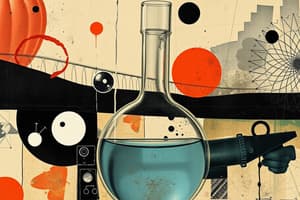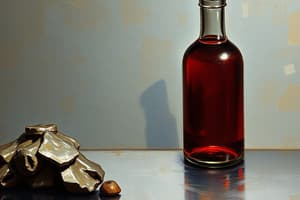Podcast
Questions and Answers
Classify the following mixtures as heterogeneous or homogeneous:
Classify the following mixtures as heterogeneous or homogeneous:
Tomato juice = Homogeneous A cup of tea with honey = Homogeneous A bowl of chicken noodle soup = Heterogeneous Urine = Homogeneous Gasoline = Homogeneous Blood = Homogeneous
Which mixtures have particles with the largest size and which has the smallest size?
Which mixtures have particles with the largest size and which has the smallest size?
Largest: suspensions; Smallest: solutions
What is the name for the laboratory equipment used to separate particles out of a suspension?
What is the name for the laboratory equipment used to separate particles out of a suspension?
Centrifuge
What are the two components of a suspension called after separation?
What are the two components of a suspension called after separation?
Why do you think some medications must be prepared as suspension?
Why do you think some medications must be prepared as suspension?
What are the two components of a solution called?
What are the two components of a solution called?
Describe what happens when a hydrocarbon is mixed with water.
Describe what happens when a hydrocarbon is mixed with water.
Which of the following substances would dissolve in water?
Which of the following substances would dissolve in water?
Which of the following solvents would you classify as polar and non-polar?
Which of the following solvents would you classify as polar and non-polar?
Which of the following will dissolve in water to form an electrolytic solution?
Which of the following will dissolve in water to form an electrolytic solution?
How many deciliters are in a liter?
How many deciliters are in a liter?
How many millimeters are in a meter?
How many millimeters are in a meter?
In which directions does water flow in osmosis between hypotonic and hypertonic solutions separated by a semi-permeable membrane?
In which directions does water flow in osmosis between hypotonic and hypertonic solutions separated by a semi-permeable membrane?
Flashcards are hidden until you start studying
Study Notes
Mixture Classification
- Tomato juice is a homogeneous mixture.
- Tea with honey is classified as homogeneous.
- Chicken noodle soup is a heterogeneous mixture.
- Urine is considered homogeneous.
- Gasoline is a homogeneous mixture.
- Blood is classified as homogeneous.
Particle Sizes in Mixtures
- Suspensions contain the largest particles among solutions, colloidal dispersions, and suspensions.
- Solutions have the smallest particle sizes.
Separation of Particles
- A centrifuge is laboratory equipment used to separate particles from a suspension.
Components of Suspensions
- After separation, a suspension results in two components: a pellet (solid residue) and supernatant (liquid above the pellet).
Medications as Suspensions
- Some medications are prepared as suspensions to assist individuals who have difficulty swallowing pills.
Components of Solutions
- A solution consists of two components: a solute (lesser amount) and a solvent (greater amount).
Hydrocarbons and Water
- When hydrocarbons are mixed with water, they do not mix and separate into two distinct layers.
Solubility in Water
- Bacon grease does not dissolve in water.
- Bleach is soluble in water.
- Sugar dissolves in water.
- Table salt is soluble in water.
- Mascara does not dissolve in water.
- Butter is not soluble in water.
Classification of Solvents
- Propan-2-ol is polar.
- Benzene is non-polar.
- Acetone is polar.
- Acetic acid is polar.
- Octane is non-polar.
- Ethyl ethanoate exhibits properties of both polar and non-polar solvents.
Electrolytic Solutions in Water
- Sodium chloride dissolves in water to form an electrolytic solution.
- Sodium carbonate also dissolves to form an electrolytic solution.
- Glucose does not form an electrolytic solution upon dissolution in water.
- K3PO4 dissolves in water to form an electrolytic solution.
- Ethanol does not dissolve to form an electrolytic solution.
- Potassium iodide dissolves in water to create an electrolytic solution.
Measurement Conversions
- One liter contains ten deciliters.
- One meter is equivalent to one thousand millimeters.
Osmosis Concept
- In osmosis, water flows from a hypotonic (diluted) solution to a hypertonic (concentrated) solution across a semi-permeable membrane.
Studying That Suits You
Use AI to generate personalized quizzes and flashcards to suit your learning preferences.




